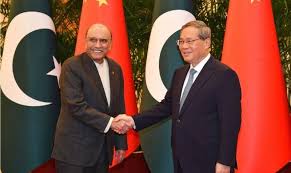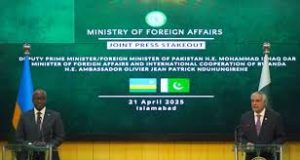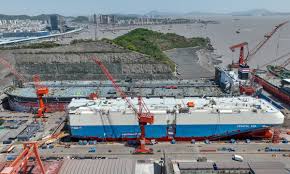China interested in enhancing Pakistan’s agriculture potential through investment: Huang Pei

Islamabad: Commercial Head of LTEC, International Agriculture Development Company of China, Huang Pei said that China was interested in enhancing Pakistan’s agriculture potential through investment.
The Commercial Head of the LTEC, International Agriculture Development of China participated in an event as a guest speaker and talked on the role of China enterprises in Pakistan at the Institute of Regional Studies jointly organized with Asian Institute of Eco-civilization, Research and Development (AIERD). The event was moderated by AIERD CEO, Shakeel Ahmed Ramay and attended by researchers, scholars, and students.
Huang Pei outlined the China Chamber of Commerce in Pakistan’s commitment to strengthening bilateral business ventures and socioeconomic cooperation, with active branches in Islamabad, Karachi, and Lahore.
The Chamber supports projects across energy, infrastructure, textiles, telecommunications, and green production, nurturing local talent and also informed about the role of these enterprises in disaster response such as a $17 million donation for flood relief in 2020. The CCCPK also carried out educational activities, signed MoU with higher education commission and played crucial role in establishing desalination plants in Balochistan and Sindh.
In the realm of CPEC’s agricultural cooperation, which began in September 2022, efforts focus on improving Pakistan’s agricultural sector, particularly chili production, through contract farming, technological support, and farmer training.
To further develop agriculture, he proposed advancements in technology, modern storage facilities, expanded market access in China, rural job creation, and the establishment of an agricultural project incubator.
Pakistan’s import value in food reached to US $ 9 billion in 2023. China can solve this problem of Pakistan by increasing cooperation in agriculture sector to not only making Pakistan food sufficient country but also enable it to export various food items to China such as rice, sesame, meat, corn, Huang added.
Ambassador Jauhar Saleem, President of IRS, highlighted the strong economic partnership between China and Pakistan, describing it as “ironclad.”
He emphasized that China is Pakistan’s top trading and investment partner, notably contributing $25 billion to the China-Pakistan Economic Corridor (CPEC) under the Belt and Road Initiative (BRI). With CPEC entering its second phase, the focus will shift to innovation, technology, mining, and agriculture—an area with significant potential in Pakistan due to its extensive irrigation, fertile land, and large agricultural workforce.
New projects, including the introduction of 5,000 tons of dry chilies and advancements in buffalo embryo technology, aim to improve product quality and distribution, promising further growth and prosperity for both nations through their continued collaboration.
Shakeel Ahmed Ramay suggested that the cooperation in agriculture will be mutually beneficial for both countries. Importing food from Pakistan will lower the transportation costs for China.In KheyberPhatunkhwa and former FATA region of Pakistan, good quality cheese is produced which also presents an opportunity for investors for exports, he informed.
China can help Pakistan in establishing research centers to increase agriculture productivity. We can learn from the best practices of China in managing water for agriculture. “China can play the role of facilitator, but we need to turn our heads,” Mr. Shakeel pointed out.





